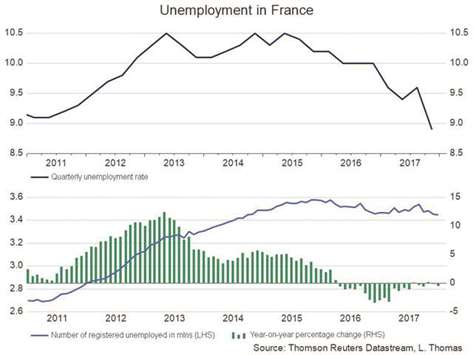France’s unemployment rate dropped below 9% for the first time since 2009, adding weight to efforts by President Emmanuel Macron to liberalise a rigid labour market that remains hamstrung by a skills mismatch.
The rate fell to 8.9% in the fourth quarter of last year from 9.6% in the previous three months, national statistics office INSEE said yesterday.
That drop was the steepest since the 2008 financial crisis, suggesting a clear break below the levels of around 10% of the last few years as an economic recovery in the eurozone gathers pace.
Around four months after, as his first major policy initiative as president, Macron changed labour rules to gave firms increased flexibility to hire and fire staff, the French economy is creating jobs at its fastest rate since 2007, INSEE said last week.
Whether unemployment can fall much further without additional reforms is far from certain, however.
“I think it’s too soon to say that Macron’s reforms are having a positive impact, but it’s clear that stronger activity and a more positive business environment are boosting employment,” Economist Diego Iscaro of IHS Markit said.
Surveys have showed business morale surging to multi-year highs since Macron was elected.
His government had come under pressure in recent weeks after several companies, including retailer Carrefour, announced sweeping job cuts.
But new jobs are being created at a faster rate, and US online retail giant Amazon said earlier on Thursday it would add 2,000 permanent contract positions this year.
Macron’s government also plans to invest €15bn in job training over the next five years, significantly expanding apprenticeship schemes under broader changes to be presented in April.
That reform will take time to kick in, leaving companies to grapple in the meantime with a widespread mismatch between those seeking work and the jobs on offer.
Even though French unemployment remains higher than the eurozone average, a lack of skilled workers is creating production bottlenecks and snarling up supply chains, company executives told Reuters last week.
That means the country may already be reaching the limits of what economists call its structural unemployment rate, which could be around 9% according to European Commission data from November.
“The available workforce doesn’t match the needs of the country’s production base, which will at some point limit the drop in the unemployment rate,” Alexandre Vincent of the COE-Rexecode think-tank told Reuters yesterday.
Macron this week identified the deterioration in the skill set of the French workforce as the most worrying issue for the economy.
“When you’re told structural unemployment is at 9%, that’s the real scandal,” he told reporters.
Because of this mismatch, French firms are starting to see wage pressure, as elsewhere in the West.
But they are also trying to avoid raising salaries by attracting skilled workers by other means, such as dangling long-term contracts, training and other perks.
Many employers have until now avoided moving to permanent contracts over fears that under France’s previous stricter labour rules they would struggle to sack workers if business turned sour.
Macron’s overhaul of the labour code has helped ease those concerns, and hiring on permanent contracts rose 6.4% in the fourth quarter to 48%, a level not seen since before the global financial crisis.
Thursday’s data also showed the number of jobless people in mainland France fell by 205,000 in the fourth quarter, bringing the total number of unemployed to 2.5mn.
The employment rate, the percentage of people in jobs, rose to 65.7%, the highest level since the early 1980s, with all age groups marking an improvement.

.
